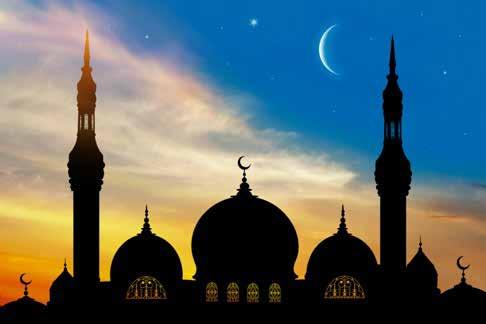
2 minute read
Ramadan
from In The Loop April 22
by Marketing
What is Ramadan?
Ramadan is the 9th month in the Islamic calendar and lasts around 29-30 days, depending on when the crescent moon is visible. During the holy month of Ramadan, millions of Muslims around the world endure a period of daily fasting from sunrise to sunset – the biggest act of religious observance of its kind and one of the five pillars of Islam.
Advertisement
By refraining from life’s pleasures – eating, drinking and sexual relations, Ramadan is seen as an opportunity for spiritual growth in which one becomes more conscious of God. However, the idea of Ramadan goes beyond staying away from food and drink, it is a period of reflection, devotion, generosity, and sacrifice. Through hunger and thirst, one can experience what it is like for those less fortunate than us and become more thankful and grateful to God. It is also a time of self- discipline and sacrifice as deliberately abstaining from enjoyable things teaches us patience, once again increasing our humility and thankfulness.
During this special month, many Muslims will also refrain from any wrongdoing that may invalidate their fast for example, violence, anger, envy, greed, and lust. Instead, they will increase charity giving, prayer and sharing food with friends, family, and neighbours.

Health Benefits of Fasting
Despite the hunger and thirst, fasting carries many health benefits according to many researchers. In recent years, numerous studies have suggested that intermittent fasting – reducing food and drink intake periodically can have a positive impact as it promotes weight loss, making it a popular diet trend.
Other benefits include:
• Reduces the risk of diabetes among those that are at high risk of it. • Improvements in blood pressure and cholesterol levels - and insulin sensitivity. • Reboots the immune system, clearing out old immune cells and regenerating new ones.
However not everyone is obligated to fast, for example young children, the elderly, those with health issues, women who are pregnant or breastfeeding and those who are travelling are exempt from fasting. Instead, if possible, they should compensate by feeding the poor or donating to charity.
Facts about Ramadan:
Ramadan follows the lunar calendar, so it moves forward by 10/11 days each year. • 1.8 billion Muslims observe Ramadan worldwide. • The longest fasting hours is in Nuuk, Greenland 19 hours and 57 mins. • The shortest fasting hours is in Christchurch, New Zealand 11 hours and 20mins.
The end of Ramadan marks the beginning of one of two major Islamic holidays Eid al-Fitr, the ‘festival of the breaking of the fast.’ On this day, it is a tradition to wear new or clean clothes and to start the day with eating something sweet like a date. Many will then attend a religious service in the morning where each household is obligated to pay a set amount to help feed the poor that day. Later on, there will be an exchange of gifts and a celebratory meal with friends and family.









